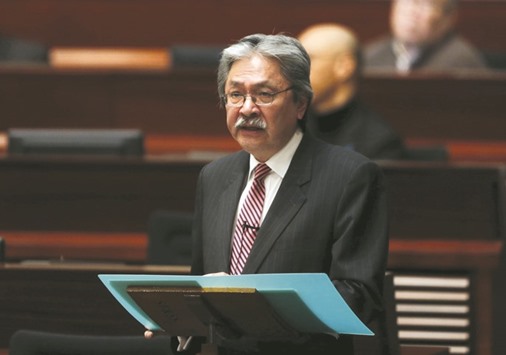Hong Kong rolled out a multibillion dollar package of sweeteners to bolster its economy yesterday, as a slowdown in China and rising political tensions deepen its economic woes.
In unusually blunt comments for a budget address, Financial Secretary John Tsang said “political volatility” was threatening to undermine the economy and warned disputes would intensify ahead of legislative elections this year, pitting the city’s democratic opposition against pro-Beijing and pro-establishment political parties. He said the conflicts must be resolved.
“Politics and economics are closely intertwined. Political volatility will unavoidably impact our economy,” Tsang said.
In the wake of a night-long ‘riot’ earlier this month that saw protesters fight pitched street battles with police, Tsang warned Hong Kong faced “even greater chaos” and risks future generations growing up “in the midst of hatred”.
Hong Kong is a special administrative region of China that returned from British to Chinese rule in 1997 under a “one country, two systems” framework that guarantees broad freedoms and autonomy.
Tsang, who said the local economic outlook was “far from promising”, expects GDP growth to slow to 1-2% this year, the slowest pace in four years.
The economy expanded 2.4% in 2015, in line with the government’s estimate, and better than a median 2.3% forecast by six economists surveyed by Reuters.
Tsang noted the economy grew a seasonally adjusted 0.2% in the fourth quarter, slowing from a revised 0.6% in the third, and expanded 1.9% from a year earlier.
Some economists said core sectors including trade, property and finance were in trouble and needed longer-term solutions. “More one-off relief measures were always likely given the weaker outlook for the Hong Kong and global economy,” said John Zhu, an economist for HSBC, who said the budget was no surprise. “The long-term challenges are not something that can be solved in a single budget. But the support for SMEs, technology and innovation is certainly what Hong Kong could do with.”
After a stint of healthy surpluses, including HK$30bn ($3.86bn) for the current financial year, Tsang said he expected the city to run up deficits in its consolidated accounts for two years starting from 2018, largely due to the need to pay for healthcare reform and retirement protection.
The city’s deep financial, service and trade links with China have also weighed on growth, including the retail and tourism sectors which have been hit hard by a drop in mainland tourists.
“Weak tourism was caused by the anti-corruption campaign in China and a relatively strong Hong Kong dollar compared to neighbouring economies,” said Iris Pang, an economist at Natixis.
Among the nearly HK$40bn worth of measures to support the economy were a personal tax cut up to HK$20,000 for some city residents, property rate waivers and a public housing supply target of 280,000 units for 10 years up to 2026.
Hong Kong home prices remain among the highest in the world.
The recent riot, slowness in rolling out major infrastructure projects such as a rail link with China and HSBC Holdings’ recent shunning of the city for its headquarters, are posing a stiff test for Hong Kong’s Beijing-backed leader Leung Chun-ying and have tarnished its reputation as a law-abiding and efficient global business hub. The shadow of 2014’s street protests and occupation of roads – part of a push for full democracy that ended without any concessions from Beijing’s leaders – also lingers. “Hong Kong is facing a structural problem,” said Avery Ng, a pro-democracy activist with the League of Social Democrats.
“Unless we have true universal suffrage, and can use our surpluses to have genuine reform in terms of the social welfare system as well as the education system...a one-time sweetener won’t help alleviate the anger of Hong Kong people.”

Hong Kong financial secretary John Tsang announces the annual budget report at the Legislative Council yesterday.
